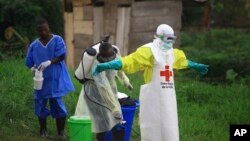An outbreak of Ebola in the eastern region of the Democratic Republic of Congo has killed more than 200 people. Almost 300 Ebola cases have been confirmed since the outbreak began in August, authorities say.
The health ministry said half of the cases were in Beni, a city of 800,000 people, in the North Kivu province.
The outbreak is in a conflict zone where dozens of armed groups operate. Aid agencies have been forced to suspend or slow down their work on several occasions since the outbreak.
Health Minister Oly Ilunga said his response teams "have faced threats, physical assaults, repeated destruction of their equipment and kidnapping."
"Two of our colleagues in the Rapid Response Medical Unit have even lost their lives in an attack," Ilunga said.
Ebola was detected in the DRC in 1976. The current outbreak is the tenth since it was first discovered.
The World Health Organization has warned the virus could spread to nearby countries, including Uganda, Rwanda and Burundi.
Medical workers have lots of experience dealing with Ebola outbreaks in the DRC. Fortunately, they have new tools to fight the deadly virus. A new vaccine has shown it can protect people who've come into contact with Ebola victims, and more people have learned techniques to keep the virus from spreading.
However, old problems persist with every outbreak. Some people still refuse to believe Ebola exists and have hidden infected family members. Traditional burial practices also put people at risk.





